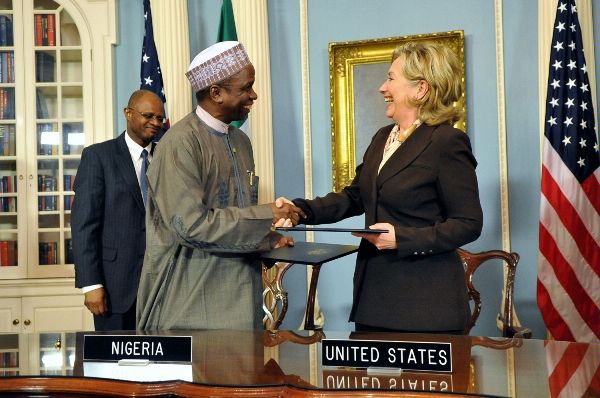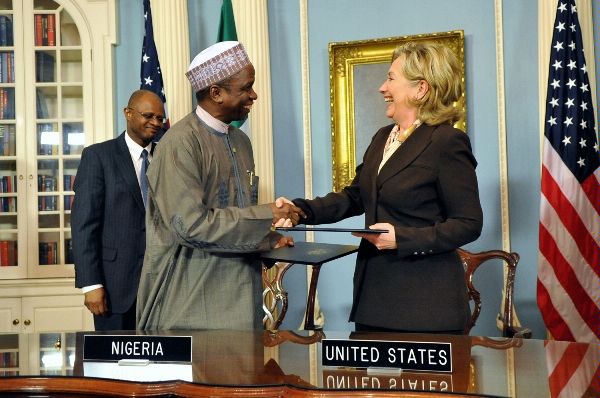ONE WORD ON SUPER BUREAUCRAT YAYALE AHMED @ 70 YEARS
By Godknows B. Igali
The date April 15, 2022 passed almost solemnly, obscured by the celebrations of the Christians’ holy day of Good Friday which, interestingly coincided with the Muslim fasting period of Ramadan and the Jewish Passover. Beyond these esoterics, is the fact that one of Nigeria’s most outstanding citizens, Alhaji Mahmud Yayale Ahmed attained the age of 70 years. Typical of the accomplished retired civil servant, accustomed to “being seen but not heard”, he allowed the date to slip by with virtually no bashing revelry.
For one who has contributed so much to the building of the Nigerian state and handled several critical responsibilities, many would have thought that Ahmed was slightly of a higher age; although his personal physique and build appear at least 10 years younger.
BUREAUCRATIC ASCENSION
At different times, he had risen to become Permanent Secretary both at his home state, Bauchi in North East Nigeria and later on at the Federal level. Thereafter, he rose to serve as Head of the Civil Service of the Federation, and then Secretary to Government of the Federation and ultimately, Minister of Defence. Till date, no other Nigerian has matched that straddling service record.
Apart from holding notable high offices, wherever he had been vested with such responsibilities, he was part of far-reaching reforms of structural nature. Actually, at the Federal Ministry of Internal Affairs, where he served as Permanent Secretary from 1994 and stayed for four (4) years, which in most countries is regarded as the mother of all other agencies, he was saddled with overseeing such critical issues as public security, civic registration, supervision of local governments nationwide, immigration, etc. A great amount of his work also touched on maintenance of law and order and even the administration of justice since such entities as immigration service, fire service, correctional service (prison), civil defence, population census, all fell under his purview. In the UK where this office is known as the Home Department, thsupervision even include the supervision of the national police.
While at Interior, Ahmed chaired a number of the Committees that dealt with Civil Service Reforms during the General Ibrahim Babangida military administration years. This laid the foundation for subsequent reviews of Public Service Rules under President Olusegun Obasanjo in 2005 and at the time of the Goodluck Jonathan presidency in 2014.
When democracy returned to the country in 1999, Obasanjo who became elected as the first civilian leader after a long period of military rule, appointed Ahmed as Head of Civil Service of the Federation of the whole country.
It needs mention, that the Nigerian Civil Service has actually been in existence since colonial rule became formal with the Amalgamation of 1914. Forty years later, with the enactment of the Lyttleton Constitution, and the “Nigeria Order in Council of April 1954”, a Federal Public Commission was established, with Dr. Samuel Manuwa as a Commissioner a British Head. It also allowed for the then three regions (Eastern, Northern and Western) to have their own Civil Services. With the attainment of independence on October 1, 1960, S.O. Wey was appointed as Secretary to the Government of the Federation and Head of Service.
Ahmed took office as “Mr. Civil Service” as he was now called under an activist, President Obasanjo who was bent on purging and re-tooling the service from its years under military rule, particularly taking advantage of the various reform recommendations which had been made over the years. These include Morgan Commission of 1961, the Adebo Commission of 1971, the Udoji Commission of 1972-74, the Dotun Philips Panel of 1985 and the Allison Ayida Panel of 1994. Of concern, however, the Civil Service had become redundant, inefficient and unproductive. This was a major thrust that Ahmed had to tackle along with his boss, Obasanjo, leading to such major initiatives as Right-Sizing and Monetisation Policies.
THE CALL TO POLITICS AND POWER
At the twilight of the Obasanjo administration in 2006, ahead of the 2007 elections, Yayale came under severe pressure to take over the mantle of leadership as Governor in his own state. However, cleverly, he seemed to have counted his teeth with his tongue and realised that his background in civil service may not make it easy to plunge into and wrestle with the class of political elite in Bauchi State. He wriggled out of partisan politics but was soon called back to service by the new President, Umaru Musa Yar’Adua to take political office as the Minister of Defence.
Again, the Minister of Defence of Nigeria, as in other countries, has one of the most far-reaching portfolios as he oversees the entire security and defence architecture of the country. The entire Army, the Navy, Air Force and Special Forces such as Joint Task forces, Multinational Joint Task Force, International Peace Keeping, etc., all report to him.
Before Ahmed, Nigeria had 11 other Ministers of Defence starting from Mohammed Ribadu, Inuwa Wada, Prof. Iya Abubakar, Akanbi Oniyangi during years of democratic governance. Under military regimes, there had been persons as Generals Iliya Bissala, Domkat Bali, and Generals Yakubu Gowon, Obasanjo and Sani Abacha who also doubled as Heads of State. With the advent of the 4th Republic, Gen. Theophilus Danjuma and former Governor of Kano State, Rabiu Kwankwaso also held the office before him.
So, Ahmed assumed that position under the shadow of some of the greatest Nigerian public servants. Although he was one of the few who did not have any military experience whatsoever, it remains to his credit that the Nigerian military attained some of its most-recorded achievements during his brief tenure.
It was however not too long as President Yar’Adua brought him back to his own turf by making him Secretary to the Government of the Federation (SGF), replacing Ambassador Babagana Kingibe, a former career diplomat and Permanent Secretary, but turned politician. Indeed, Kingibe was former Vice-Presidential candidate to Moshood Abiola, reputed to have won the 1993 presidential elections. This prestigious but tasking position of SGF is the ultimate pinnacle of the core public service in the federation.
The SGF has, traditionally, been vested with the role of being the engine room of the government as its functions cover the General Administration of the country, its Political Affairs, Cabinet Secretariat of the Federal Executive Council, Special Duties and Special Services offices. Nowadays, it also oversees a number of other institutions such as the Niger Delta Development Commission (NDDC), North East Development Commission (NEDC), the Ecological Fund Office (EFO), etc.
Interestingly enough, each of these sections of the SGF’s office is manned by a civil servant of senior Permanent Secretary rank.
From independence, the office of SGF had up till 2011, been exclusively occupied, for good reasons, by retired Federal Permanent Secretaries. These included S.O. Wey who was the pioneer till the outbreak of the 1966 military coup. During the war years, M.A. Ejueyitche held sway. Thereafter, came the Igbira-born A.A. Attah whose stint was from 1970-1972, followed by S.O. Lawson from 1972-1975 and then came the super Permanent Secretary, Allison Ayida, whose tenure was from 1975-1977.
Up till the handover of power to civilians in 1979, came Ali Ciroma while during the entire period of the Second Republic led by President Shehu Shagari from 1979-83, Shehu Musa was in place and thereafter another super Permanent Secretary, Gray Longe whose tenure covered the military regime of Gen. Muhammadu Buhari. This was followed by the long tenure of President Babangida which had four senior Permanent Secretaries, Olu Falae, Aliyu Mohammed and the brief tenure of Mustapha Umar, and Aminu Saleh whose service years ended in 1995.
Towards the end of military rule, the last SGF, Gidado Idris worked with Gen. Abacha from 1995-99 while Chief Ufot Ekaette, opened the 4th Republic as SGF from 1999 to 2007. This was followed by Ambassador. Kingibe before the entrance of Ahmed. Somehow, he became the last core civil servant to hold the office, as subsequent Presidents, in exercise of powers under Section 172 (2) of the 1999 Nigerian Constitution, have continued to appoint other Nigerians outside the civil service.
Ahmed stayed in that position from 2008 until the death of President Yar’Adua in 2011. For several reasons which included the inclement health of the president under whom he served, the Office of the SGF became inundated with great powers and technically ran the entire business of Government in the country. The death of President Yar’Adua sent Ahmed technically to an early retirement from public limelight at the age of 58 years.

During the period as SGF, one of his greatest achievements was his role in bringing peace to the Niger Delta as his office was the nucleus of the negotiations toward peaceful resolution of the crisis which rocked that region at the time.
Prior to Yar’Adua’s election as President, his predecessor, Obasanjo had in 2005 created an Office of Honorary Advisor on the Niger Delta headed by Ambassador Godknows Igali, a career diplomat. This office was subsequently dissolved and replaced with what was known as Niger Delta Peace Committee which was co-chaired by the SGF on the one hand and what came to be known as “Oporoza House” headed by Niger Delta activist, Chief T.K. Ogoriba on the other.
This process of engagement and the rest of the activities culminated in the Declaration of Amnesty for Niger Delta agitators in June 2009.
LATER SILENT ACTIVISM
In the quiet of his seeming retirement, Yayale has proved his mettle as a silent operator as he has remained one of the key actors in various back-channel discussions on the current state of affairs and future of Nigeria. Being a trusted source for well-vetted private communications, he has continued to work towards consensus-building. This he has done, taking advantage of his influence as one of the most respected bureaucrats from the north of Nigeria.
Besides, he is from no less a respected place as Katagum, in Bauchi State, a place which boasts as one of the core traditional emirates in the north. Yayale has indeed, followed the cosmopolitan legacy of First Republic politician, Dr. Sule Katagum, the first indigenous and longest-serving Chairman of the Federal Civil Commission.
In addition to these, he also works as one of the traditional title holders (Ajia Katagum) with the current Emir of Katagum Alhaji Umar Kaber Umar who himself was a Federal Permanent Secretary until he assumed office after the death of his father, Alhaji Dr. Kabir Umar, the 11th Emir of Katagum. He also boasts of other traditional honours from several parts of Nigeria.
Closeness to his Northern, Fulani aristocracy, had tended to expose him to lack of regard in some quarters at a time when inter-etnic distrust seems balloon anew. No, his urbane nature and network around the country continues to glide him into the centre of the stage behind the closed doors.
Tracking back, after his birth on 15th April, 1952, much of his upbringing has been in his home town, Azare, Katagum, where he went to Primary School and later Secondary School during the war years, 1967-71. Thereon, he proceeded to Ahmadu Bello University, earning a Bachelor’s degree in Political Science in 1976 and later a Master’s Degree in Public Administration in 1981.
In the course of his service, he had variously been honoured with doctoral degrees from Bayero University, University of Benin and University of Abuja. Of equal note is his earned fellowship from the Nigerian Institute of International Affairs (NIIA), Nigerian Institute of Management (NIM) and the Nigerian Institute of Quantity Surveyors (NIQS).
He was also decorated with the high national honour of Commander of the Order of the Federal Republic, CFR which comes next only to the Grand Commander of the Order of the Niger, and the Grand Commander of the Federal Republic in terms of respect and prestige in Nigeria.
SIGNING-OFF WORDS
For a country the size of Nigeria, many great people have continued to toil to build the nation to what it is today. Since his graduation from Ahmadu Bello University (ABU), Zaria, Ahmed has continued to leave great strides in the service of Nigeria.
He has obviously kept faith with those harkened words of contemporary influencer, Idowu Koyenikan, “Your pride for your country should not come after your country becomes great; your country should become great because of your pride in it.” In silence and relative anonymity, he toils without pause as was well envisioned in his unspoken contribution to peace in the Niger Delta to make Nigeria a better place. Till date, he holds sway as boss of the high-level think-tank, Council of Retired Federal Permanent Secretaries (CORPS) in Abuja, the Federal Capital.
At just 70, Yayale Ahmed is at a good age for more work, so it remains to be seen if the hand of destiny and chance will still propel him to higher national service.
Happy birthday, sir.
Igali is a former Ambassador and retired Federal Permanent Secretary












